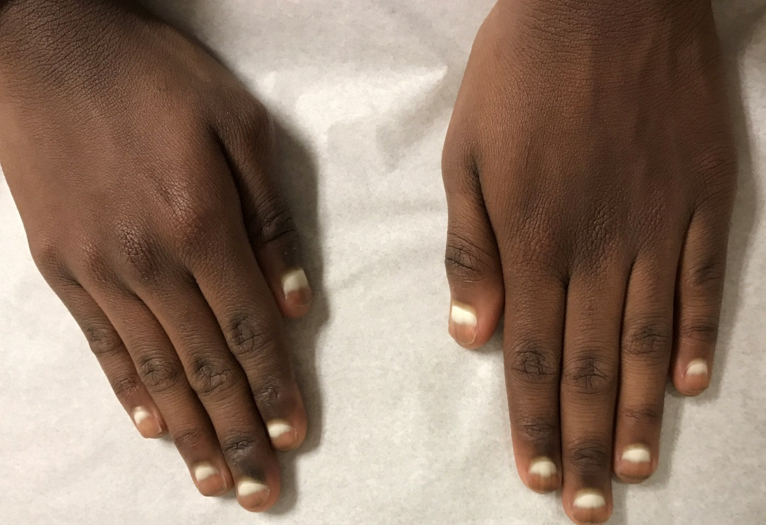
Last week, we extensively paid attention to the Siamese twin-like relationship between the heart and the kidneys. What you may not know is that there is a relationship between kidney disease and virtually ALL organs in our bodies. One of these is the skin.
The skin is undoubtedly the largest organ in our body. It may be hard to consciously be aware of this. When you think about it though, the skin covers every part of your body. It is the reason why we cannot physically see your internal organs. It is what gives you the lovely complexion on your face. We have a lot to attribute to the skin.
It follows then, that the skin enjoys a high volume of blood supply all day long. Therefore, any issue related to the blood will easily manifest on the skin. In fact, all issues affecting our internal organs tend to show up on the skin. Kidney disease was not to be left out.
Common Skin problems in kidney disease
One of the functions of the kidneys is toxin removal. You can check out the other functions of the kidneys on a YouTube video I shyly made. This is the link https://youtu.be/_vdZUx6Nah4. Warning, I am extremely gorgeous on camera ha ha.
One of the toxins that we need to remove through urine is urea. Urea is the end product of protein metabolism in our body. Urea level (usually tested in a laboratory) must remain within a certain level in your blood to allow normal function of body cells. When kidneys fail, urea removal is compromised. This urea circulates in the bloodstream. Initially it is not a problem until the body cannot cope anymore. Urea then starts getting absorbed into organs like the brain, heart and lungs.
Urea also creeps into the skin forming white salt-like substances. These are easily seen on the skin of someone with advanced kidney disease. They appear like someone was hit with pellets of salt on different areas of the skin like the forehead and the arms. For some people with a darker skin tone, the skin appears as if patches of ash were capriciously smeared on the skin.
Besides urate crystals, the skin may become very dry and easily breakable in kidney disease. Patients are usually encouraged to use creams to keep the skin soft and supple. This dryness is because cells that produce sebum, an oily substance that naturally keep our skin soft are destroyed by the presence of urea. Sebum naturally acts like a lubricant for our skin against friction. When we are protected from friction, we do not allow water to pass into our bodies. You can say sebum makes our skin waterproof. That is why we bathe and swim as the water drips off our skin in scintillating drops. Stupefying sebum!
In addition, kidney disease may make the skin appear dull and easy to break after a scratch. This is common even for patients on dialysis. Good dialysis will eventually sort this out. It requires patience though.
The nails too may appear banded in kidney disease. These bands are like tiny little strings that form on the nails. At any point, our nails tell a lot about our internal organs. Another curious manifestation of advanced kidney disease is half and half nails. In this scenario, the nails appear pink on upper side and white on lower side as if geometrically separated. Some may appear white on upper side and retain their pink colour on the lower side. The image below may help you to understand this concept.

The other common skin manifestation of kidney disease is swelling. The swelling may appear under the eyes, on ankles, shins, wrists or even on the abdomen. This is usually a sign of kidney damage to some degree. This tells us that the kidneys are not removing excess water from the body.
Generalized itching on the skin is another unmistakable depiction of kidney disease. The skin just itches. In fact, inexperienced healthcare workers may dismiss the patient as a hypochondriac. Or just someone who wants some attention. I was a victim of this as a young student of nursing in her first placement in the wards. I still vividly recall this gentleman who would not leave the Nurses’ station with incessant complains of itchiness.
He further reported the same to the attending medical doctor. See, he was due for a surgery the following morning and the doctor equally dismissed this as anxiety related the upcoming surgery.
When the anaesthetist came to review the patient before surgery, she was keen to request for kidney function tests of the gentleman. The urea was up the roof, and the kidneys were quickly shutting off. It took the intervention of the anaesthetist to have this patient referred to Kenyatta National Hospital (Kenya’s and East Africa’s largest referral hospital) for acute assessment and possible dialysis.
This image was to reappear to me when I studied renal nursing. I remembered this gentleman and all his protests of an intractable itch. An itch so bad that it denied him adequate sleep. From then I am careful when patients complain of an itch which has defied all local and common explanations like an allergic reaction.
Solutions and remedies
The skin is the first organ the world sees in us. This is why the beauty and cosmetic industry has thrived for long and will only get better with time. How our skin feels and appear to ourselves influences our self-esteem. It follows then that skin issues whether or not related to kidney disease will easily affect a person’s mental wellbeing.
Besides adequate dialysis and regular assessment of whether the dialysis is working well, it would help to buy some creams for the dry skin. A good cream will be one that contains moisture so as to keep the skin well lubricated. There are several of these creams in all pharmacies across the globe.
An itchy skin will need, besides dialysis, a good anti-itch tablet or cream. It is important that a licensed prescriber prescribes one after properly examining you.
I cannot overemphasize the need for a good medical review. Some skin issues will lead your consultant to refer you to a skin specialist called a dermatologist. Dermatologists have been extensively trained in dealing with some skin issues in kidney disease. Other skin issues will not even be related to the disease. They will be entirely different conditions by themselves or autoimmune conditions of the skin. This is why a good medical review is always important.
Self-diagnosis and treatment usually lead to incorrect actions against yourself. Let your healthcare provider also know about any herbal or alternative therapies you have been using. These might interact with your kidneys or your skin making it difficult to pinpoint why exactly you have the dry skin, the itchy skin or even the white crystals on the skin.
If the skin is painful, a doctor or a licensed prescriber like advanced nurse practitioners may prescribe a cream or a tablet to relieve pain. This is important to be prescribed only by the licensed people. I say this heart in hand for the lack of proper pharmaceutical regulations in my homeland Kenya. It is sad that we have unscrupulous chemists where anyone can buy any medication, no questions asked. Nevertheless, individual health is entirely a personal responsibility.
I hope that with these few paragraphs, we can all see how the kidneys affect the skin. The list I have compiled is by no means exhaustive. However, it points us to a fact that we must pay attention to our skin for it is literally and figuratively, the mirror to our internal wellbeing.
